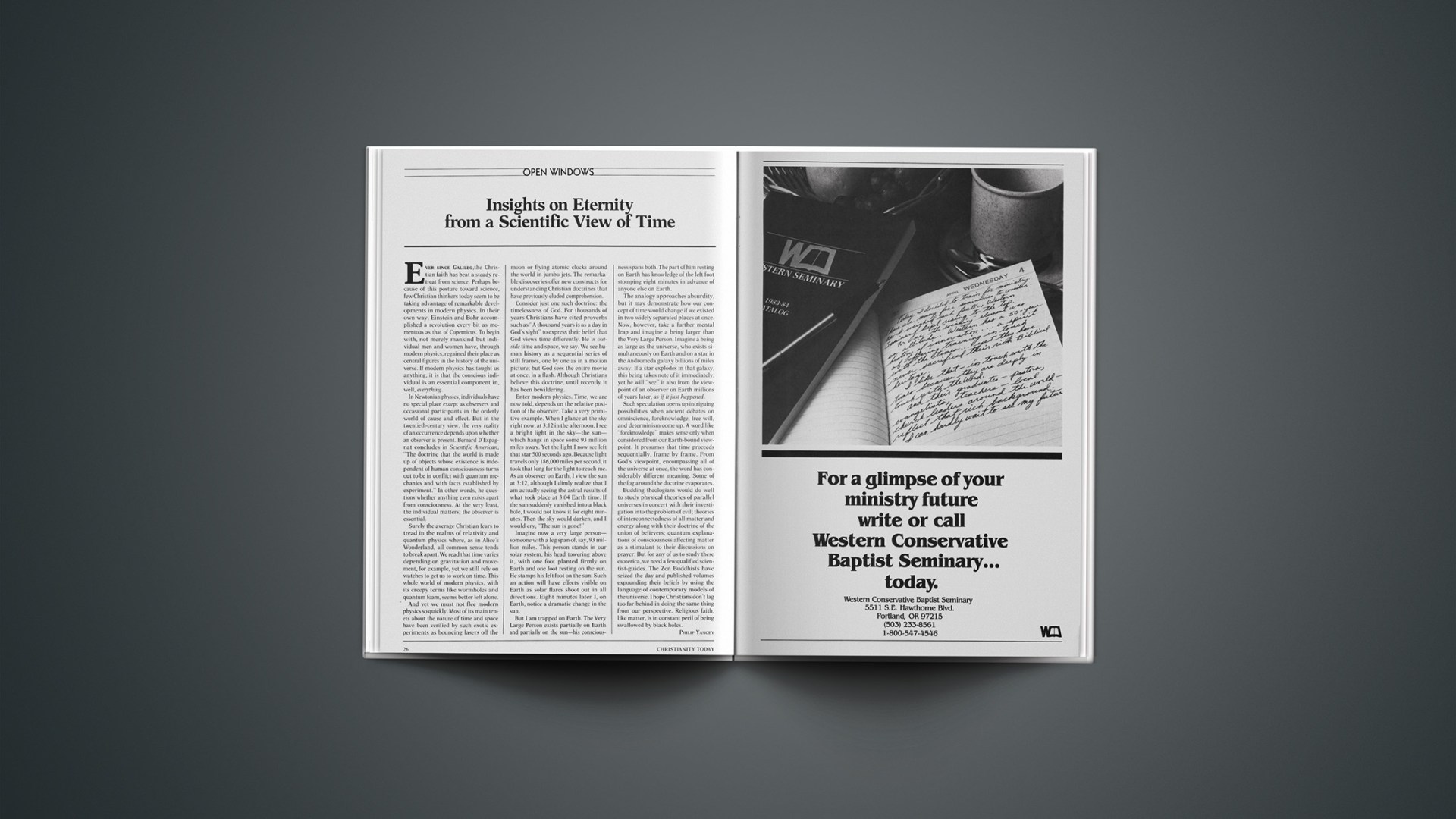Ever since Galileo, the Christian faith has beat a steady retreat from science. Perhaps because of this posture toward science, few Christian thinkers today seem to be taking advantage of remarkable developments in modern physics. In their own way, Einstein and Bohr accomplished a revolution every bit as momentous as that of Copernicus. To begin with, not merely mankind but individual men and women have, through modern physics, regained their place as central figures in the history of the universe. If modern physics has taught us anything, it is that the conscious individual is an essential component in, well, everything.
In Newtonian physics, individuals have no special place except as observers and occasional participants in the orderly world of cause and effect. But in the twentieth-century view, the very reality of an occurrence depends upon whether an observer is present. Bernard D’Espagnat concludes in Scientific American, “The doctrine that the world is made up of objects whose existence is independent of human consciousness turns out to be in conflict with quantum mechanics and with facts established by experiment.” In other words, he questions whether anything even exists apart from consciousness. At the very least, the individual matters; the observer is essential.
Surely the average Christian fears to tread in the realms of relativity and quantum physics where, as in Alice’s Wonderland, all common sense tends to break apart. We read that time varies depending on gravitation and movement, for example, yet we still rely on watches to get us to work on time. This whole world of modern physics, with its creepy terms like wormholes and quantum foam, seems better left alone.
And yet we must not flee modern physics so quickly. Most of its main tenets about the nature of time and space have been verified by such exotic experiments as bouncing lasers off the moon or flying atomic clocks around the world in jumbo jets. The remarkable discoveries offer new constructs for understanding Christian doctrines that have previously eluded comprehension.
Consider just one such doctrine: the timelessness of God. For thousands of years Christians have cited proverbs such as “A thousand years is as a day in God’s sight” to express their belief that God views time differently. He is outside time and space, we say. We see human history as a sequential series of still frames, one by one as in a motion picture; but God sees the entire movie at once, in a flash. Although Christians believe this doctrine, until recently it has been bewildering.
Enter modern physics. Time, we are now told, depends on the relative position of the observer. Take a very primitive example. When I glance at the sky right now, at 3:12 in the afternoon, I see a bright light in the sky—the sun—which hangs in space some 93 million miles away. Yet the light I now see left that star 500 seconds ago. Because light travels only 186,000 miles per second, it took that long for the light to reach me. As an observer on Earth, I view the sun at 3:12, although I dimly realize that I am actually seeing the astral results of what took place at 3:04 Earth time. If the sun suddenly vanished into a black hole, I would not know it for eight minutes. Then the sky would darken, and I would cry, “The sun is gone!”
Imagine now a very large person—someone with a leg span of, say, 93 million miles. This person stands in our solar system, his head towering above it, with one foot planted firmly on Earth and one foot resting on the sun. He stamps his left foot on the sun. Such an action will have effects visible on Earth as solar flares shoot out in all directions. Eight minutes later I, on Earth, notice a dramatic change in the sun.
But I am trapped on Earth. The Very Large Person exists partially on Earth and partially on the sun—his consciousness spans both. The part of him resting on Earth has knowledge of the left foot stomping eight minutes in advance of anyone else on Earth.
The analogy approaches absurdity, but it may demonstrate how our concept of time would change if we existed in two widely separated places at once. Now, however, take a further mental leap and imagine a being larger than the Very Large Person. Imagine a being as large as the universe, who exists simultaneously on Earth and on a star in the Andromeda galaxy billions of miles away. If a star explodes in that galaxy, this being takes note of it immediately, yet he will “see” it also from the viewpoint of an observer on Earth millions of years later, as if it just happened.
Such speculation opens up intriguing possibilities when ancient debates on omniscience, foreknowledge, free will, and determinism come up. A word like “foreknowledge” makes sense only when considered from our Earth-bound viewpoint. It presumes that time proceeds sequentially, frame by frame. From God’s viewpoint, encompassing all of the universe at once, the word has considerably different meaning. Some of the fog around the doctrine evaporates.
Budding theologians would do well to study physical theories of parallel universes in concert with their investigation into the problem of evil; theories of interconnectedness of all matter and energy along with their doctrine of the union of believers; quantum explanations of consciousness affecting matter as a stimulant to their discussions on prayer. But for any of us to study these esoterica, we need a few qualified scientist-guides. The Zen Buddhists have seized the day and published volumes expounding their beliefs by using the language of contemporary models of the universe. I hope Christians don’t lag too far behind in doing the same thing from our perspective. Religious faith, like matter, is in constant peril of being swallowed by black holes.










